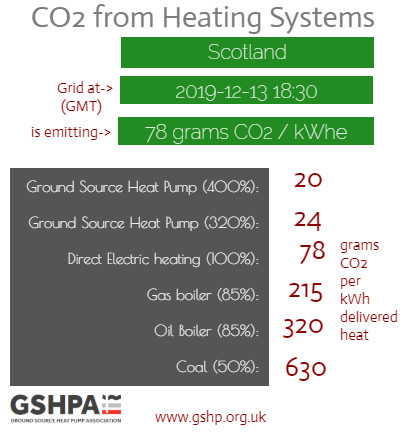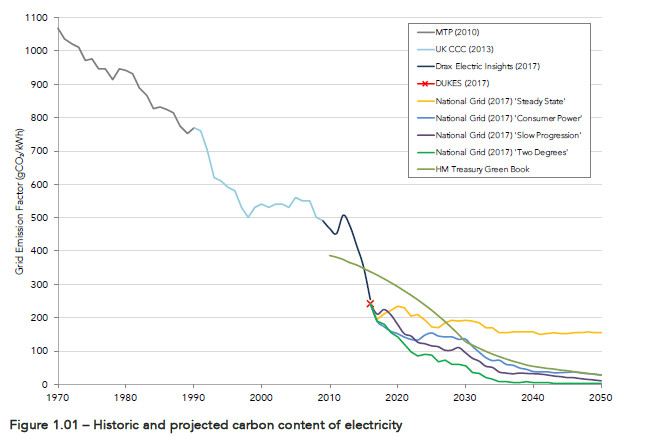CO2 Emissions Calculator for Heat Pumps

GSHPA is a finalist in the HVR Awards
Launched in 2010 the annual HVR Awards celebrate excellence and innovation in the building services sector.
The GSHPA is a finalist in the HVR Awards for the Sustainable Product of the Year with its Realtime CO2 Emissions Calculator for ground source heat pumps.
CO2 Emissions Calculator
The Carbon Emissions Calculator shows the CO2 being issued in grams for each kWh of heat delivered by the most common forms of heating, on the assumption that the heat pumps are using electricity from the Grid.
The amount of CO2 emitted by a gas boiler is constant at 215 grams of CO2 per kWh of heat delivered (assuming the boiler is 85% efficient). Gas issues far less CO2 than burning oil, which in turn emits much less than burning coal.
However, the very clear winner is to use a heat pump which issues no CO2 at all if it uses green electricity. Even if the heat pump uses grid electricity only a small fraction of the CO2 issued by a gas boiler will be issued by the Grid when supplying an efficient heat pump.
The app shows the current amount. This has fallen rapidly from the amount that would have been issued in 2011 as the grid has been decarbonising rapidly. The historic and projected CO2 emissions are shown on the graph below.
The message is very clear: if we want to reduce carbon emissions from heating we can do so now by using heat pumps.
Air quality is also a key driver
A significant benefit of heat pumps over conventional gas boilers is that there is no combustion involved (combustion of gas emits oxides of nitrogen). Beside the direct advantages (safety), technical advantages (no need for flues) this is very beneficial for cities like London with poor levels of air quality.
Alternative forms of low carbon heating
Alternative forms of low carbon heating have also been considered including direct electric heating, which has a significantly higher running cost; and the burning of hydrogen which emits no CO2 at the point of combustion.
However, upgrading the gas grid to contain very small hydrogen molecules would incur a huge national cost and upgrading all the boilers to burn hydrogen would also be a significant task. Production of hydrogen by steam reformation emits large volumes of CO2 which would require the development of economic Carbon Capture and Storage to achieve carbon neutrality.
Hydrogen can also be derived from electrolysis powered by renewable electricity, although the overall efficiency would be less than 70% before accounting for distribution losses, compared to an efficiency of well over 300% for a typical ground source heat pump.
It is clear that the only practical route to heating without CO2 emissions is to avoid combustion. The alternative is to use heat transfer: which means using heat pumps. There is no need to search for esoteric alternatives when tried-and-tested heat pumps are available now.
See Renewable Heating See Renewable Cooling



